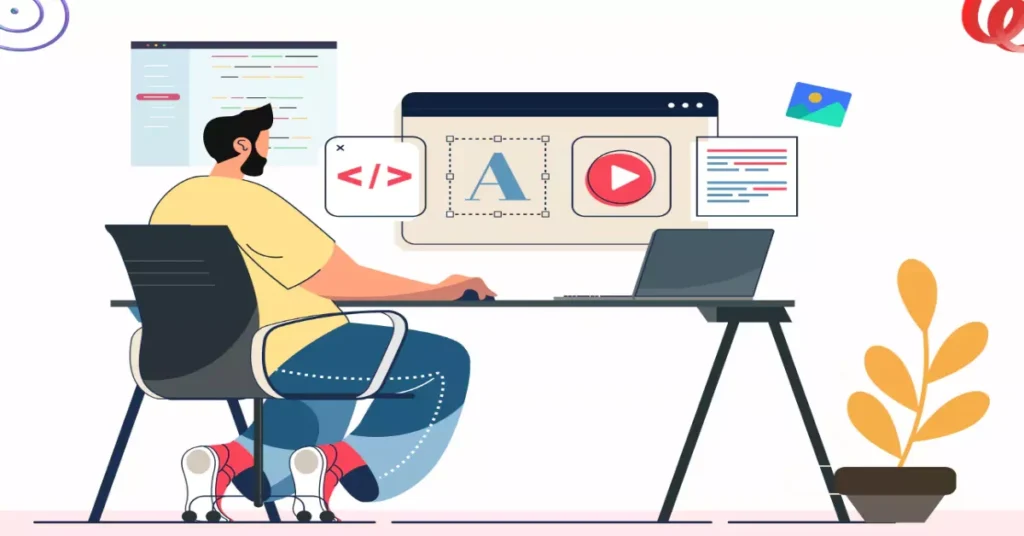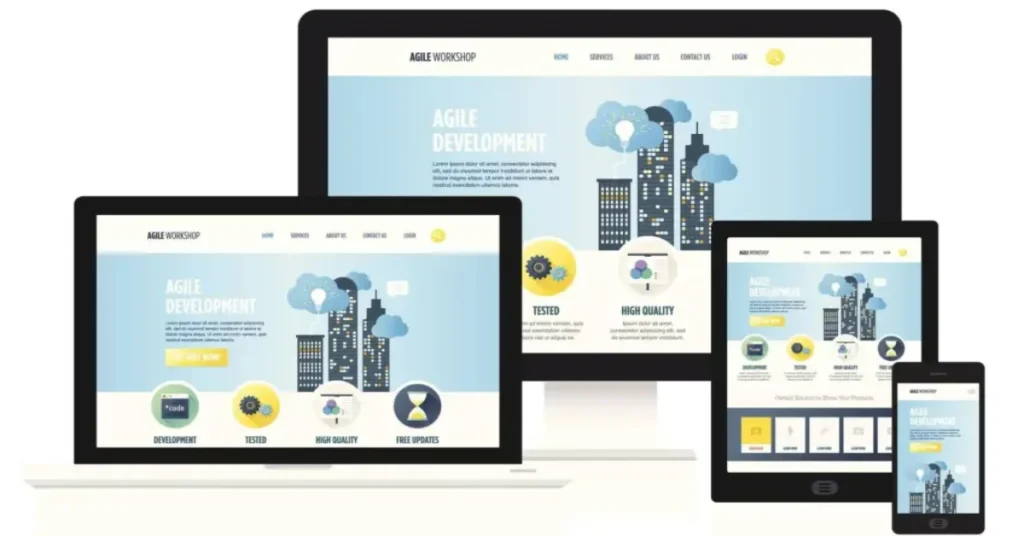The best AI website builder are truly changing the way we build websites. Gone are the days when creating a professional online presence meant hiring expensive developers or spending weeks learning complicated code. Today, these intelligent tools make it simpler and faster than ever before. I’m ready to talk about something fascinating: how artificial intelligence is changing the way we build websites.
The Rise of AI in Web Design

AI has swept into every part of our lives, and web design is no exception. It’s like having a super-smart assistant guiding you through every step of building your site. AI is transforming website creation by automating many tasks that used to take hours. This means anyone, even without design experience, can create a stunning website.
Think about the benefits:
- Speed: AI can generate a complete website draft in minutes.
- Ease of Use: You don’t need to write code. Drag-and-drop interfaces are common.
- Professional Look: AI helps ensure your site looks polished and modern.
This guide is for you if you’re a small business owner, an entrepreneur, or just someone who wants a great website without the fuss. I’ll walk you through the top AI website builders. We’ll explore what makes them tick and even look at aspects many reviews miss. We’ll discover how AI can truly empower you to build your dream site.
Understanding AI Website Builders: What Sets Them Apart?
Let’s start by clarifying what an AI website builder is. It’s more than just a tool with pre-made templates. We’re talking about sophisticated systems that use generative AI, natural language processing, and machine learning. They don’t just fill in blanks; they understand your needs and create something unique.
How do they differ from traditional website builders?
- Automation vs. Manual Input: Traditional builders require you to pick every element. AI builders suggest and even create elements for you.
- Speed: AI accelerates the design process dramatically.
- Smart Suggestions: AI offers intelligent recommendations for layouts, content, and visuals.
Core AI Capabilities to Look For
When you choose an AI website builder, you want to see these powerful features:
- AI-powered site generation: You type in a few words about your business, and the AI drafts a complete website.
- AI content generation: Need text for your “About Us” page or product descriptions? AI can write it for you.
- AI image generation and editing: Create unique images or modify existing ones. Think background removal or style transfers.
- AI SEO optimization: The AI helps you write meta tags and suggests keywords to improve your search engine ranking.
- AI design assistance: It recommends color palettes, font pairings, and even optimizes layouts for different devices.
The “Intelligence” Factor: Beyond Marketing Hype
Many builders claim “AI.” But what does that mean? Is it just a fancy way of saying “automated templates,” or does it truly think? I’ve noticed many reviews don’t dig deep here. We need to ask: How smart is the AI? Can it truly grasp your specific prompt nuances? Does it learn from your feedback, adapting and improving over time?
For example, if I ask an AI website builder to create a site for a “boutique coffee shop specializing in artisanal, ethically sourced beans with a cozy, rustic aesthetic,” does it just pull generic coffee shop images? Or does it suggest dark wood textures, warm lighting, and perhaps even a section for bean origins? The difference shows true intelligence. You want an AI that feels like a genuinely creative partner, not just a quick template filler. This deeper understanding of the AI’s capabilities helps you avoid surprises later.
The global AI-powered website builder market is projected to grow from USD 3.17 billion in 2023 to USD 31.5 billion by 2033, with a CAGR of 25.8%. Cloud-based platforms dominate with over 75% market share, appealing to SMEs due to affordability and scalability. SMEs held 63% of the market in 2023, driven by the need for quick and user-friendly website solutions.
North America led the market with a 40.5% share in 2023, while Asia Pacific is the fastest-growing region due to rapid digital adoption. Key growth drivers include increased demand for online presence, rising e-commerce activity, and advances in AI. However, limited customization, data privacy concerns, and skepticism about AI personalization remain challenges.
Major players include Wix, known for its AI-driven design tools, and GoDaddy, which offers the Airo platform for small businesses. Continued innovation and trust-building will be critical for future growth (Source: Market.us).
Top AI Website Builders in 2025: In-Depth Reviews & Comparisons
Let’s look at the top contenders. I’ll focus on what makes each stand out for users in the United States.
1. Wix AI
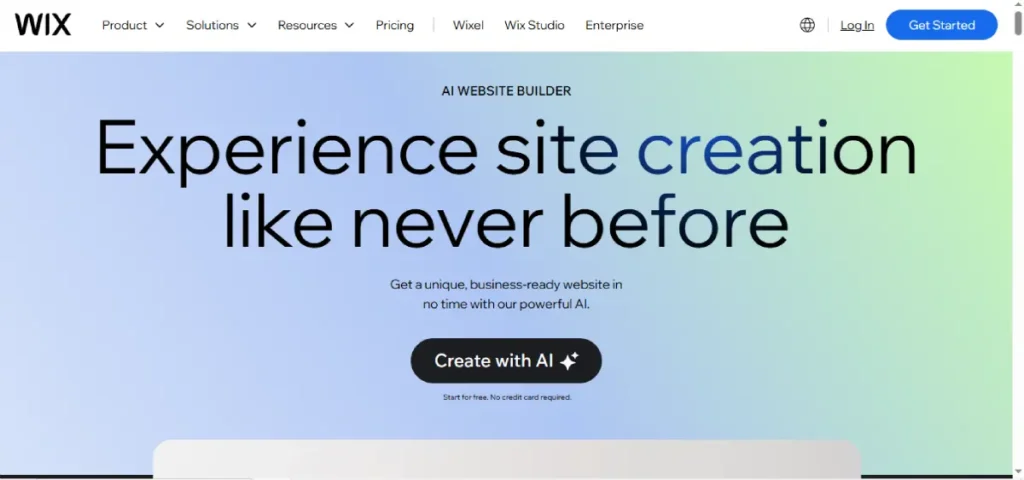
Wix has been a leader in website building for years, and its AI tools show that experience. They call their core AI “Artificial Design Intelligence” (ADI).
- Pros: Wix offers a comprehensive set of AI tools. You get extensive customization options after the AI generates your initial site. It boasts a huge library of templates and strong e-commerce features. Wix ADI quickly builds a site after a few questions. Users report that the framework is often excellent, even if the content needs some tweaking.
- Cons: Wix can be more expensive than some competitors, especially for advanced features. Sometimes, the initial AI-generated layouts might need significant manual adjustments to feel truly unique.
- Key AI Features: AI site creation, AI text and image generators, built-in ChatGPT for content, and its seasoned ADI.
- Best For: Overall flexibility. Choose Wix if you want AI assistance but also desire strong control over your final design.
- Pricing (US): Wix offers a free plan with limitations. Paid plans typically start around $17/month for Lite, $29/month for Core, and go up to $159/month for Business Elite, offering various storage and collaboration options.
2. Squarespace Blueprint AI
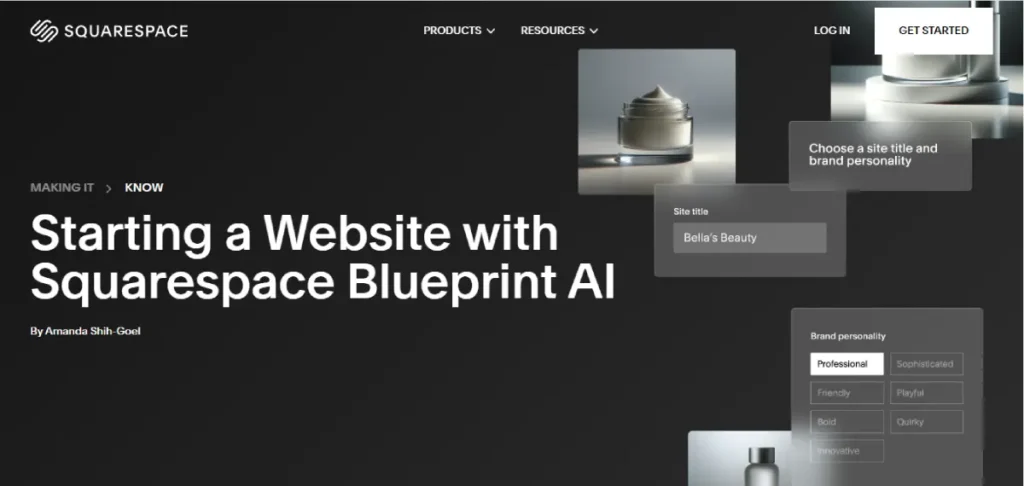
Squarespace is known for its beautiful designs, and its AI tools aim to keep that reputation. Blueprint AI changes how you start building. Instead of choosing a template, it guides you through a quiz. Squarespace offers powerful AI design tools, but understanding its pricing structure can be key to maximizing its value. To help you navigate the various options and choose the perfect fit for your budget and features, I’ve put together a detailed guide on Squarespace Website Pricing: How to Find Your Perfect Plan.
- Pros: Squarespace excels at creating visually stunning sites from the start. Its Blueprint AI offers a collaborative process. It’s excellent for design-focused users. You get professional font pairings and consistent color use. They also provide solid e-commerce features.
- Cons: Squarespace AI’s content generation can sometimes feel generic. There may be less design control after the initial AI generation compared to traditional template choices. Customization of complex features can sometimes feel limited.
- Key AI Features: Blueprint AI for custom site generation, AI text generation, AI for brand identity (colors, fonts), business-specific page suggestions.
- Best For: Creative professionals, artists, and businesses where aesthetics are a top priority.
- Pricing (US): Squarespace plans generally range from around $16 to $49 per month, depending on features like e-commerce and advanced analytics.
3. Hostinger AI Website Builder
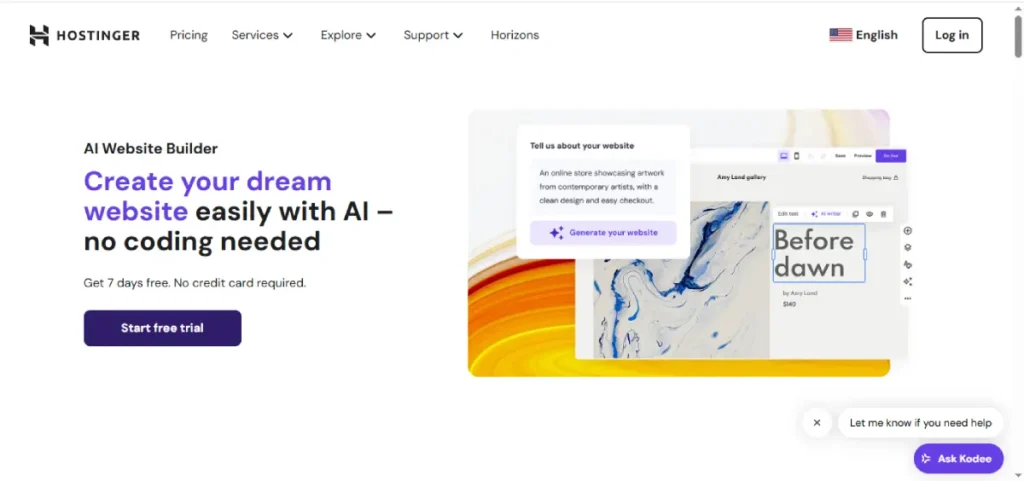
Hostinger brings an affordable entry point to AI website building. It’s designed for quick and easy site creation. While exploring Hostinger’s AI website builder, you might be curious about its overall performance and user experience. For a deeper look into the platform’s reliability, customer support, and value for money, be sure to check out our comprehensive Hostinger Reviews blog post.
- Pros: Hostinger is incredibly budget-friendly. It’s very easy to use, especially for beginners. The AI tools get your site up and running fast. It also offers WordPress integration for more advanced users.
- Cons: A recent review mentioned that Hostinger’s AI tools populated “fake reviews” on test sites, which is a significant concern for authenticity and SEO. This issue needs careful monitoring by users. Some advanced marketing tools are not built-in, which means you might need third-party integrations later.
- Key AI Features: AI writer, logo generator, image generator, blog generator, AI heatmap (for analytics), and SEO assistant.
- Best For: Beginners, small businesses on a tight budget, or those needing a fast, simple personal or business website.
- Pricing (US): Hostinger is one of the most affordable. Plans start as low as $2.99/month (with a long-term commitment) and go up to around $7.99/month for cloud startup plans.
4. Shopify (with AI Magic features)
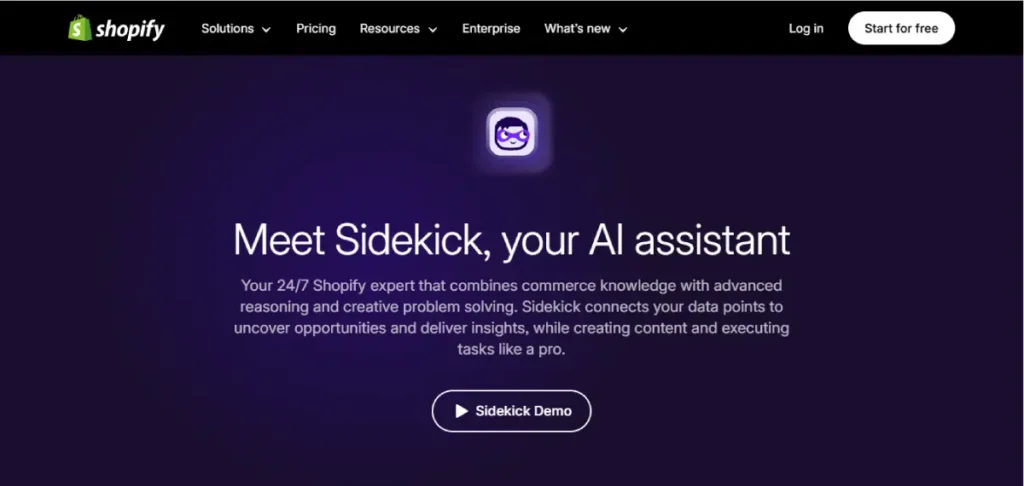
Shopify is the go-to platform for e-commerce, and its AI capabilities are tailored to selling online.
- Pros: Shopify offers unmatched e-commerce features. Its AI excels at generating product descriptions and marketing content. Smart inventory tracking helps manage stock. It simplifies technical SEO for online stores.
- Cons: Shopify is primarily an e-commerce platform. Its general website-building features are secondary. It can be more expensive, especially for businesses needing advanced e-commerce tools.
- Key AI Features: Shopify Magic (for product descriptions, marketing copy), Shopify Sidekick (an AI assistant), AI image editing (like background removal).
- Best For: Online stores and e-commerce businesses of all sizes, from startups to large enterprises.
- Pricing (US): Shopify’s Basic plan starts at $39/month (or $29/month billed annually). More advanced plans like “Shopify” (formerly Grow) cost $105/month, and “Advanced” costs $399/month. Shopify Plus is for enterprise-level businesses.
5. GoDaddy Website Builder
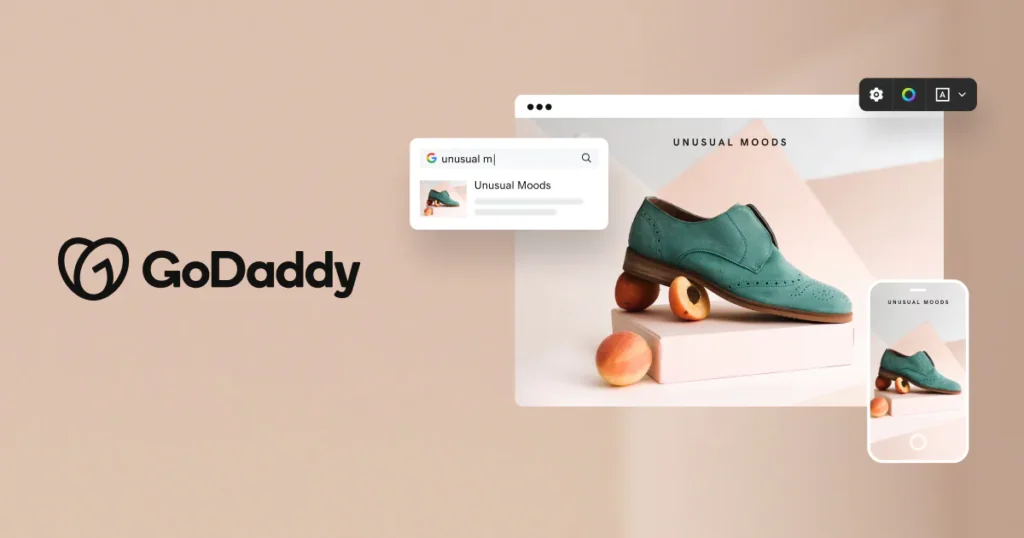
GoDaddy offers a straightforward AI website builder, especially appealing to those already using its hosting or domain services.
- Pros: GoDaddy provides a very fast and easy setup process. It integrates well with GoDaddy’s other services, like domain registration and hosting. It’s good for building basic business websites quickly.
- Cons: GoDaddy’s AI may offer less design flexibility compared to platforms like Wix. It provides fewer customization options post-generation. While easy, the designs can sometimes feel generic.
- Key AI Features: GoDaddy Airo, social media post generator, headline generator, AI-generated text for website elements.
- Best For: Businesses needing a quick, simple online presence. It’s ideal for existing GoDaddy customers.
- Pricing (US): GoDaddy offers plans starting at around $9.99/month for a basic AI website builder plan (with a 1-year term), going up to $20.99/month for e-commerce features.
6. 10 Web AI
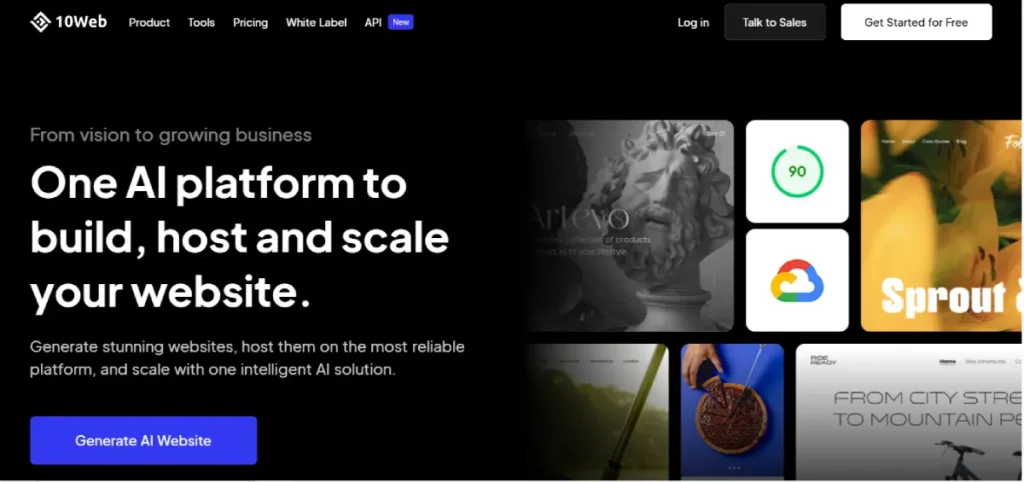
10Web focuses on bringing AI power to WordPress users. It’s unique because it generates full WordPress websites.
- Pros: 10Web is excellent if you want to use AI but still have the power and flexibility of WordPress. It can even replicate existing websites using AI. Customization happens through the popular Elementor page builder.
- Cons: You might need some familiarity with WordPress to fully appreciate its capabilities. The learning curve could be steeper than for pure drag-and-drop builders. While AI-generated designs are impressive, they still often need manual refinement to achieve a truly unique look.
- Key AI Features: AI website generation from descriptions, AI Co-Pilot (for content and images), AI SEO tools.
- Best For: WordPress users who want to use AI for faster site creation and optimization. It’s also great for agencies or developers needing to quickly prototype WordPress sites.
- Pricing (US): 10Web AI Premium starts around $30/month, and AI Ultimate is about $45/month. These plans offer varying AI word counts, storage, and visitor limits.
7. Other Notable AI Website Builders
Other strong options include:
- Jimdo: Known for its simplicity and quick AI-driven setup.
- Durable: A popular choice for small businesses, offering a site in 30 seconds.
- Framer: Ideal for designers, providing strong AI tools and the ability to export code.
- SITE123: Offers a very easy-to-use AI-powered website builder for free.
- IONOS: Provides AI-driven smart suggestions for site creation.
Key Factors to Consider When Choosing an AI Website Builder

Choosing the right AI website builder involves more than just looking at the flashy features. Let’s think about some deeper questions that will help you pick the perfect one.
Your Specific Needs & Goals
First, define what you need.
- What type of website? Are you building a blog, an online store, a portfolio, a service business site, or something personal?
- What’s your budget? Many offer free plans or trials, but paid plans vary widely.
- What’s your technical skill level? Are you a complete beginner, or do you have some coding knowledge?
True AI Capabilities & Customization
This is where we go beyond the marketing claims. How intelligent is the AI?
- How deep does the AI go? Can it generate complex, multi-layered layouts, or is it better at basic structures? Imagine you want an interactive map on your site. Can the AI suggest and integrate that, or does it only handle text and image blocks?
- How much control do you have? After the AI does its initial work, can you easily change colors, fonts, or move entire sections around? Some builders give you full editing freedom, while others are more restrictive.
- Can you add custom code? For users with some technical skills or who might hire a developer later, the ability to add custom HTML, CSS, or JavaScript is invaluable. Does the platform allow this, or is it a completely closed system? This determines how much unique functionality you can build into your site. Think about a custom calculator for your services, or a unique animation. If you can’t add custom code, those ideas might remain just ideas.
Scalability and Long-Term Viability
Your website might start small, but what if it grows?
- Can the builder support growth? If your blog gets thousands of visitors, or your online store handles hundreds of orders a day, will the platform keep up? Can it handle large content libraries or sudden traffic spikes?
- Are there limitations for advanced features? What if you decide to add a members-only section, a complex booking system, or integrate with a niche customer relationship management (CRM) tool? Some builders have limits on these. Knowing these limitations upfront prevents headaches later.
- How easy is it to move your site? If you eventually outgrow the platform, can you easily export your data and switch to another service?
Data Ownership and AI Training Practices
This is a critical, often-overlooked area. When an AI builds your site, what happens to your data? Goji Labs’ article on AI privacy concerns outlines major risks and protective strategies. Key issues include excessive data collection, lack of transparency in AI decision-making, and weak data security. To mitigate these risks, the article recommends implementing access controls, conducting regular audits, and minimizing collected data. Educating users about data practices is also emphasized as a critical step toward safeguarding privacy in an AI-driven world
- Does the builder use your content or design choices to train its AI? Many AI models improve by learning from vast datasets. Are your unique designs or written content becoming part of a general model that helps others?
- Is this stated? Check the terms of service. You want transparency about how your data contributes to the AI’s learning.
- What are the privacy implications? We’re all more aware of data privacy now. Understanding this aspect helps you make informed decisions. It’s about protecting your unique intellectual property and customer information.
Integration Ecosystem
Your website often needs to connect with other tools.
- Beyond the basics: Most builders integrate with common tools like Google Analytics or popular email marketing services. But what about more specific needs? Do they connect with specialized CRM systems, advanced marketing automation platforms, or industry-specific tools? For a restaurant, does it connect with specific reservation systems? For a fitness studio, link with class scheduling software?
- How seamless are these connections? You want integrations that work smoothly, without needing complex workarounds.
SEO & Marketing Tools

Getting found online is crucial.
- Beyond basic meta tags: Many AI builders offer basic SEO tools like generating meta titles and descriptions. But what about more advanced features? Can you control structured data markup (which helps search engines understand your content better)? Can you easily manage canonical tags or hreflang tags for multilingual sites?
- Technical SEO performance: How do AI-generated sites perform on metrics like Core Web Vitals (loading speed, interactivity, visual stability)? These factors significantly impact search rankings.
- AI for content analysis: Does the AI help you identify content opportunities or suggest improvements to existing content for better search visibility?
Customer Support & Resources
Even with AI, you might need help.
- Availability: Does the builder offer 24/7 support, live chat, phone, or email?
- Quality of support: Are the support agents knowledgeable and helpful?
- Learning resources: Look for a comprehensive knowledge base, tutorials, and an active user community.
Real-World Examples & Case Studies
Seeing is believing.
- Showcase successful sites: I want to see examples of thriving websites built primarily with each AI builder. Not just generic templates, but actual businesses.
- Diverse use cases: Show me an e-commerce store, a portfolio, a blog, and a service-based business site. This helps me visualize what’s truly possible for my project.
- Highlight AI’s contribution: How did the AI specifically help these businesses achieve their goals? Did it save them time? Improve their design?
The Future of AI in Web Design
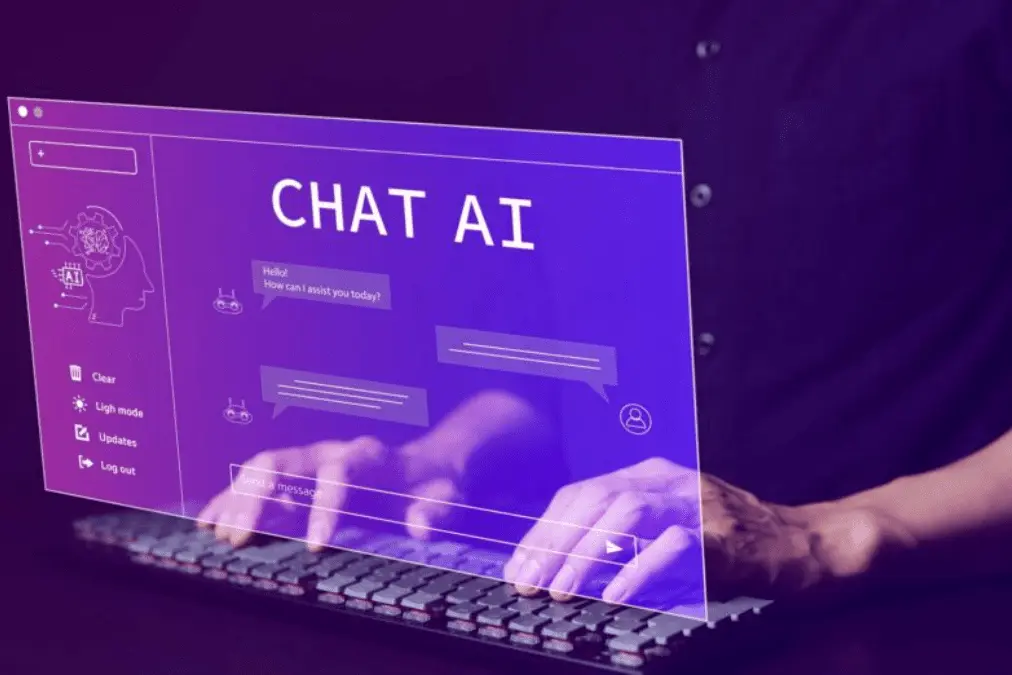
The world of AI is moving at lightning speed. What’s next for AI website builders?
Emerging Trends & Innovations
- Hyper-personalization: Imagine a website that adapts its content and layout based on each visitor’s behavior and preferences. AI will make this deeply personal experience common, much like how streaming services suggest movies just for you.
- Voice-activated design: Soon, you might just tell the AI what you want: “Change this heading to blue” or “Add a testimonial section here.”
- Predictive design adjustments: AI could analyze user data and automatically suggest design changes to improve engagement or conversions before you even realize a problem exists.
- More sophisticated AI agents: Expect AI assistants to handle even more complex tasks, like integrating advanced tools or running small-scale marketing campaigns.
The Evolving Role of the Human Designer/User
This doesn’t mean humans are out of the picture. AI will become a powerful co-pilot. You’ll still provide the vision, the unique brand identity, and the crucial human touch. Creativity, critical thinking, and empathy will be more important than ever. AI handles the repetitive tasks, freeing you to focus on strategic decisions and truly connect with your audience.
Conclusion
Choosing the best AI website builder means looking beyond the surface. It means understanding the true intelligence of the AI, considering your long-term needs, and being aware of important factors like data handling and true customization.
For overall flexibility and control, Wix AI remains a strong contender. If stunning design is your priority, Squarespace Blueprint AI shines. Hostinger AI is a fantastic budget-friendly option, while Shopify dominates for e-commerce. GoDaddy is ideal for creating quick and simple websites. And if you’re committed to WordPress, 10Web AI offers a compelling solution.
The potential of AI to empower everyone to build an online presence is truly exciting. We are at the beginning of a remarkable journey where building a website becomes intuitive, efficient, and endlessly creative.



